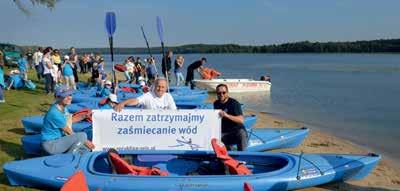Fight against marine litter
Plastics and environment
Plastic litter in the marine environment is a global phenomenon, with final solution still remaining a distant prospect despite
numerous actions from all parties involved, including the industry. Causes, assessment of effects, and search for solutions have only been a matter of serious debate for about a decade. The need to reduce marine litter was expressed in EU legal provisions as one of the elements of the circular economy, for example in the form of a requirement to reduce marine litter by 30% by 2030 and in the SUP Directive (see page 20). Discussion on the matter is also being conducted at a global level within the UNEP, which brings together representatives of countries from all around the world (United Nations Environmental Assembly, UNEA). The declaration summarizing the last UNEA meeting (March 11-15, 2019) states that the United Nations will engage in seeking solutions to environmental damage caused by the use of plastic products, and that their irresponsible disposal in the environment is in contradiction to the principles of sustainable development. Almost all (over 80%) plastic waste polluting marine environment comes from the land as a result of a lack of any effective waste management system and inappropriate behavior by people, namely littering. Plastics are lightweight materials whose waste is carried away by wind or floats on the water surface; therefore they are more visible in the environment than other types of waste. At the same time, the plastics industry has drawn attention to the fact that plastics have a high value as a recyclable material, and for this reason, they should not end up in the environment at all. As part of dealing with environmental pollution, we promote selective waste collection which constitutes the basis for an increase in recycling and the return of these resources to circulation. The global plastics industry implements a voluntary Operation Clean Sweep® program aimed at preventing the loss of plastic pellets and their release into the environment. In Poland, the program is executed by two plastic-producing companies, Basell Orlen
27









